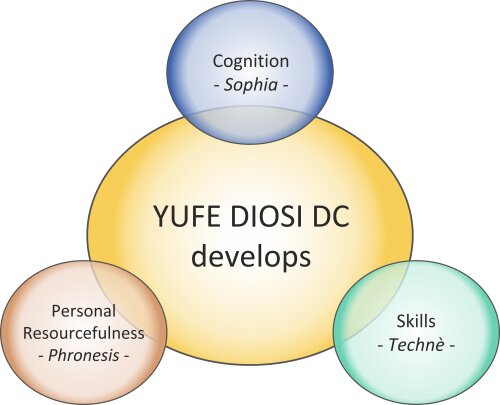Vision
A PhD at the University of Antwerp requires reflection, insight and self-development beyond developing research expertise and gaining teaching experience.
Through the doctoral study programme, the University of Antwerp supports its doctoral researchers in developing a wide range of competences and shapes them into versatile professionals. The doctoral study programme is compulsory but flexible and can be tailored to individual needs.
The UAntwerp doctoral study programme aims to:
- train doctoral researchers in both research skills and transferable skills;
- increase the self-awareness of doctoral researchers about their talents, capacities and skills;
- understand the added value of a PhD and learn to express this in terms of competences;
- stimulate reflection on career opportunities and on individual professional goals.
As part of the YUFE pilot ‘Doctoral Learning’ (Young Universities for the Future of Europe), the vision of the YUFE DIOSI Model on Doctoral Learning (Developing and Implementing hands-on training on Open Science and Open Innovation) will be integrated in the existing UAntwerp vision on doctoral learning.
In the YUFE DIOSI Model, doctoral research as a whole aims to develop skills/virtues within three domains through formal and informal training (Fig. 1).
The first domain includes the acquisition of knowledge at the highest level within a given subject ('sophia'), the second and third domains include the acquisition of specific research techniques and cross-disciplinary skills ('technè') and an adaptability to deploy the appropriate knowledge and techniques in certain situations, independence, integrity and maturity ('phronesis'). Additionally the importance of interdisciplinarity is also emphasized.

Fig. 1: YUFE-DIOSI virtues source: Kersschot, 2021 based on Mowbray & Halse, 2010. DC stands for ‘Doctoral Candidate’.
Competence profile
The doctoral study programme is structured around a competence profile. This competence profile is based on the Joint Skills Statement and the Researcher Development Framework, developed by Vitae from the United Kingdom and adapted for PhD researchers of the University of Antwerp.
These competences are important for completing research projects successfully, but will also prepare PhD researchers for their postdoctoral career, in or outside the academic world. The competence profile consists of seven competence categories:
A. Research skills and techniques
B. Adaptation to the research environment
C. Research management
D. Personal effectiveness
E. Communication skills
F. Networking and teamwork
G. Career management
Podcast: 4 skills for researchers of the future
In this podcast policy advisor Margaux Kersschot explains which skills researchers of the future will need.
Competence development
The competence profile consists of a table per competence category. Each table contains the title of the competence category and a description of the specific competences that are part of this category. Finally, these descriptions are supplemented by several concrete examples of activities and courses that can contribute to the development of competences within this category.
Please consult the PhD regulations of your faculty for a list of activities and courses that can be valorised as part of the doctoral study programme.
We advise you to review this competence profile at the start of your PhD and analyse your strengths and weaknesses. Based on this analysis, you can determine which competences you definitely want to sharpen during your doctoral training. Do this in close consultation with your supervisor(s).
The Antwerp Doctoral School has its own varied range of courses that are free for doctoral researchers who follow the doctoral study programme (ADS course offer). In addition, other services of the University of Antwerp also organize courses that can be valorised as part of the doctoral study programme. Furthermore, an inter-university training offer was developed in collaboration with the four other Flemish universities. Finally, many faculties, departments, research groups and individual researchers organize activities aiming to support and train young researchers (e.g. domain-specific training). These bottom-up organized activities can be financially supported through the annual OJO call.
Participating in courses, conferences or summer schools can cost a significant amount of money. The Antwerp Doctoral School provides a virtual financial backpack in the form of educational credit to ensure that you can undertake activities in Belgium and abroad on your own initiative.
The practical information about the doctoral study programme can be found under Obligations during the PhD (annual progress report) and Preparing the defence (minimum requirements and completion of the study programme) of the PhD Procedure.